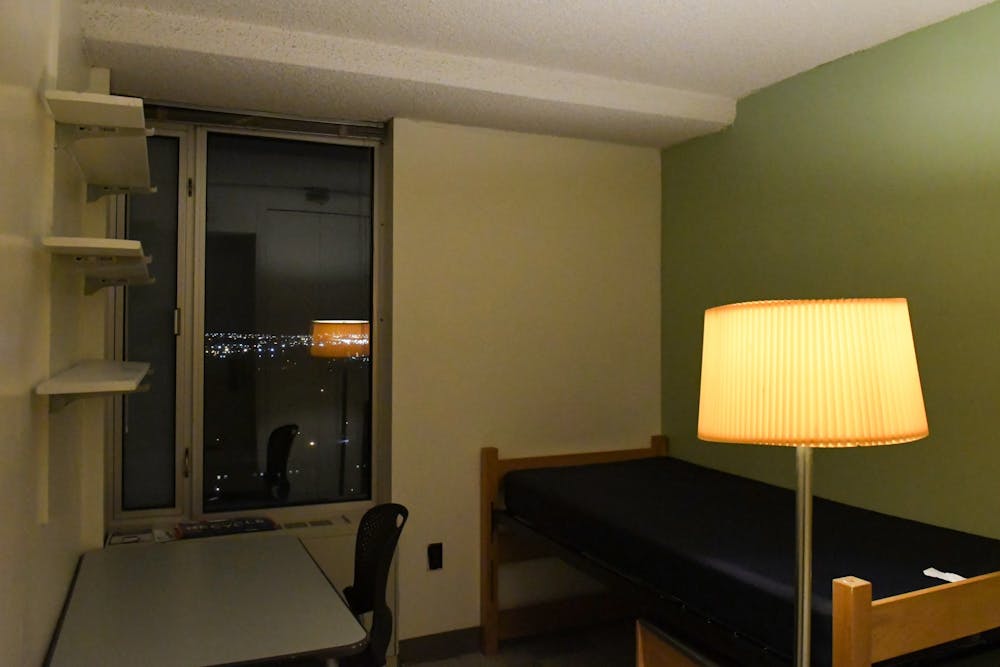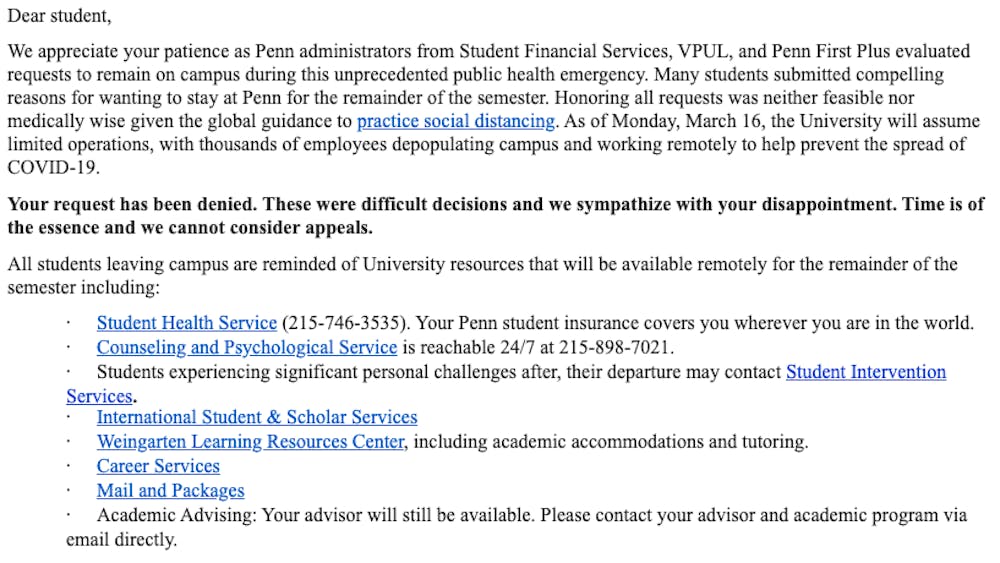
Many students are being denied on-campus housing without possibility of appeal.
Credit: Sukhmani KaurCollege junior Ennie Gantulga does not know where she will live after Tuesday.
She cannot immediately return to her home in Mongolia, as the country has barred all international flights into the country until at least March 28. But Penn has rejected her application to stay at Harrison College House, and the rejection email said the school will not consider an appeal.
Two days before Penn's mandatory move out date, many students like Gantulga must leave their on-campus residences with nowhere to go.
Though Penn said students who need to stay on campus because of travel restrictions or other personal reasons can apply to stay on campus through an online form, many students are being denied housing without possibility of appeal, prompting confusion, panic, and protests.
"In their email, it was very obvious that this is a permanent decision, there's no going back and forth," she said. "I understand this is a really tough time and Penn didn't see this coming, but I wish they could have been a little more empathetic with the whole process."
Gantulga is currently scrambling to find temporary housing, but has no family in the United States. She is considering traveling to Singapore to stay with family there, but worries about making the long trip through international airports and possibly infecting her sister's three young children with coronavirus.
Though Gantulga does not think she will be able to appeal the University's decision, some students have received follow-up emails approving them to stay on campus after previously being rejected.
If College and Wharton sophomore Linda Wang returns to her home in South Korea, a country classified Level 3 by the Centers for Disease Control and Prevention, she is worried she will contract the coronavirus, or that she will not be able re-enter the United States due to a potential travel ban from the Trump administration.
The University originally denied her application to remain on campus Sunday afternoon, but sent a follow-up email saying she has been approved to stay on campus and that the rejection email was sent in error.
The Residential Services original email denying Wang’s request read, “Many students submitted compelling reasons for wanting to stay at Penn for the remainder of the semester. Honoring all requests was neither feasible nor medically wise given the global guidance to practice social distancing.”
Email sent to students who were denied on-campus housing

Email sent to students who were approved on-campus housing

An email from International Student and Scholar Services to international students Wednesday stated that students from Level 3 counties — currently China, Iran, Italy, and South Korea — may return home but are not expected to do so.
Wang said she suspects a lack of communication between different areas of the University led to confusion and erroneous statements made to students from Level 3 countries.
“I feel like a lot of trust has been broken, because now I feel like I can't trust whatever the University is telling me. I have to constantly second guess what they're saying and make a plan B and C,” Wang said.
Wang is currently staying with her boyfriend’s family in New Jersey, but is not sure whether she can or should return to campus now that she has left.
“If I had received this news earlier back when it was more relevant, then I would have stayed on campus, but now that I received this news I don't know if I should completely change my plans for the next few months,” Wang said.
Some Penn students took to Twitter to protest against the University denying on-campus housing to students, using the hashtag #HoldPennAccountable.
College junior Silvia Ayala started the hashtag on Sunday afternoon, modeling her Twitter activism after Harvard students who also took to social media to share their stories.
“The community isn’t just sitting around and just taking this,” Ayala said. “There’s a conversation happening and people are mobilizing.”
Though Ayala herself has been approved to stay on campus, she is frustrated with the way the school is handling the situation, and worries for her peers that have been denied.
Ayala said the University’s application for remaining on campus should have been more considerate to their specific situations. She said the application was one question, asking why students needed to stay on campus, with three options — because of financial reasons, because they are international students, or for other circumstances, which they could explain in a comment box.
College junior Anika Dalvie also took to Twitter to criticize the University’s frequent denial of on-campus housing for students with nowhere else to go.
“There are students who would be homeless if they couldn't live on campus, who live in active war zones who can't go back home, or people who live with parents who are older, who they could potentially be a risk to,” Dalvie said.
Senior reporter Conor Murray and staff reporter Elizabeth Meisenzahl contributed reporting.
The Daily Pennsylvanian is an independent, student-run newspaper. Please consider making a donation to support the coverage that shapes the University. Your generosity ensures a future of strong journalism at Penn.
Donate






